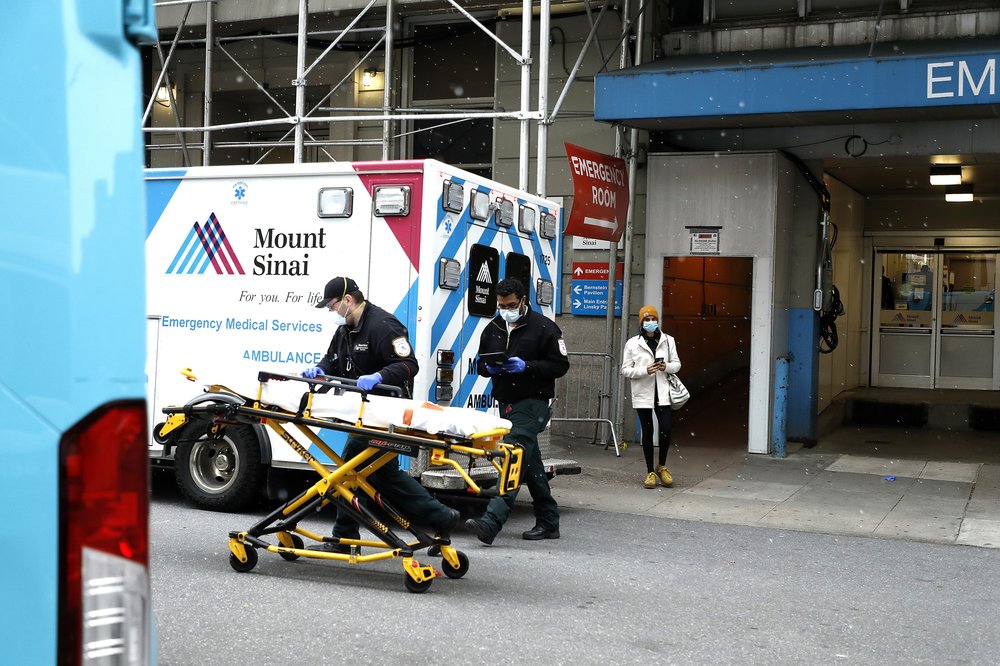Beth Israel delaying lifesaving care for patients because of service cuts, state says
March 26, 2024, 1:28 p.m.
The Manhattan hospital is sending some patients to other hospitals since it lacks the resources to treat them, according to the state health department.

Patients of Mount Sinai Beth Israel hospital in Lower Manhattan have faced delays in receiving lifesaving care because of unapproved service cuts, according to a new report from the state health department.
Through observations and interviews with hospital staff during a visit in late January, state health officials concluded the hospital was operating at severely reduced capacity — in violation of state laws and a cease-and-desist notice the department issued in December to halt the hospital’s planned closure.
The Mount Sinai health system announced last year it would close Beth Israel in phases and shut it down entirely by July. But the health department ordered the hospital not to cut any beds or services without permission. Officials found during the January visit that some service reductions were made after the cease-and-desist letter was sent.
Community advocates on Monday filed the state report as evidence in their own court case seeking to stop Beth Israel’s closure.
Beth Israel was operating with a capacity of 88 medical or surgical beds in late January, when it was certified for nearly 500, according to the report. The intensive care unit, which was certified for 36 beds, had been reduced to 16, and several other units were either closed or understaffed.
The report includes reviews of several incidents where it said the service reductions affected patients with life-threatening conditions.
State officials reviewed the medical records of one patient who was brought into the emergency room at Beth Israel on Dec. 28 and found to be unresponsive, the report said. The patient was diagnosed with an intracerebral hemorrhage, or bleeding into the brain tissue, which requires immediate intervention. But the doctor determined the patient should be transferred to Mount Sinai West because Beth Israel’s ICU was full, according to the report.
Another unresponsive patient was brought to the emergency room at Beth Israel on Jan. 22 and diagnosed with pneumonia and septic shock, the report stated. Again, the physician determined the patient needed to be transferred to another hospital. During the health department’s visit to Beth Israel, a staffer confirmed the transfer happened due to a lack of capacity in the ICU, per the report.
Hospital officials are currently reviewing the report and “plan a very detailed and robust response to the state’s allegations,” said Mount Sinai spokesperson Loren Riegelhaupt.
Riegelhaupt reiterated Mount Sinai’s previous comments that the hospital has had “significant staff departures” since announcing its closure last year, “which put severe pressure on our ability to safely care for our patients.”
“Throughout this process we have been in close contact with [the health department] and ensured they were fully aware of why and how all decisions were made,” he added.
The state health department did not immediately respond to a request for comment on Tuesday about what the performance improvement plan for Beth Israel will now look like, or whether the hospital will face any sanctions. The department previously said violations of the cease-and-desist order could produce daily fines of up to $2,000.
The community advocates also filed a separate report on Tuesday from the federal Centers for Medicare and Medicaid Services as evidence in the court case. That report found Beth Israel doctors were not sufficiently documenting the risks and benefits of transferring patients to different hospitals, in violation of federal law.
“These deficiencies have been determined to be of such character as to substantially limit the hospital’s capacity to furnish adequate care and/or as to adversely affect the health and safety of patients,” Denise Elliott, a health quality review specialist with the U.S. Department of Health and Human Services, wrote in a letter to Beth Israel President Elizabeth Sellman on March 14. The letter stated that Beth Israel would no longer be able to accept Medicare starting in mid-June if the hospital did not remedy the issue by May.
Riegelhaupt emphasized that the finding described in the letter was related to documentation and not the quality of care provided. “We take any findings very seriously and will redouble our efforts to address the cited finding involving fully documented records,” he said in a statement.
The lawsuit seeking to stop Beth Israel’s closure also names the state health department as a defendant. The plaintiffs allege that health officials have not been fulfilling their duties under state law to regulate hospital closures, which the health department denies.
The judge in the case issued a temporary restraining order against Beth Israel in February that echoes the state’s cease-and-desist order. But the health department opposed the restraining order in court papers last week, saying the court should not intervene in the regulation of medical facilities.
Riegelhaupt said the hospital plans to comply with the temporary restraining order.
Mount Sinai confirmed earlier this month it was not renewing certain stroke and cardiac designations and that ambulances would stop taking stroke and cardiac patients to the hospital on March 10. The health department did not weigh in on that move at the time, but a lawyer for Mount Sinai claimed in a court filing about the change that the health department was fine with it.
Elected officials rallied outside Beth Israel alongside community members on Sunday to oppose the planned closure.
Mount Sinai has said in the past that the hospital is losing too much money to stay open. Riegelhaupt said on Tuesday that the hospital still needs to close “and nothing about today’s allegations changes these facts.”
Beth Israel in Manhattan ending stroke and cardiac services as closure plan looms Mount Sinai, UnitedHealthcare reach deal after leaving patients in limbo